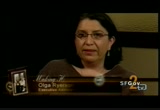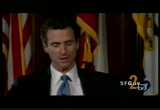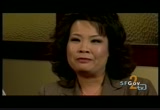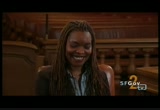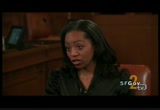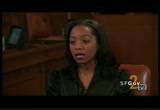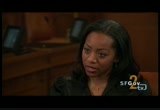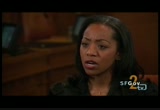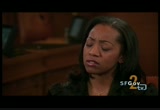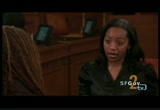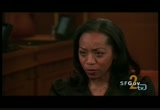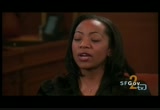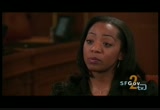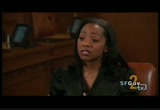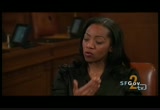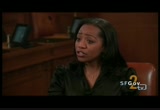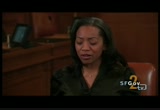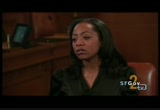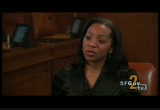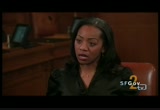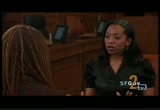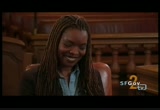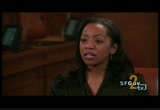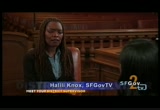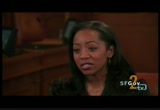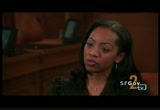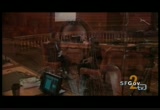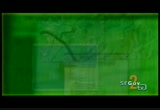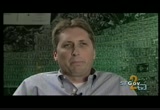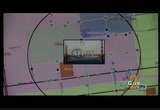tv [untitled] July 8, 2011 9:00pm-9:30pm PDT
9:00 pm
francisco city employees out shined >> it should have happened years and years ago, and that's why i am so proud to be a part of this. that's why the late nights didn't bother me. i would get exhausted. in terms of what i'm doing, i feel so good. i feel so good about san francisco and the impact we are making in the state. we changed the state. >> you had clerks in the state of california that didn't step up. they walked away. we are not only going to not do same sex marriages not a second time any. in contrast, in san francisco, this is what we can do, add up all these computers here. expand our capacity by x.
9:01 pm
we can open up early. stay open late and on weekends. it's unbelievable and we coordinate all the training and get all through the process and make sure everything is signed and certified. that's a model for others. what happens is, when people prove things can be done. it raises the bar for what's possible. >> i think a lot of people were here from 2004 and they knew what that was like and wanted to take part in 2008. i think people really again, you know, stepped up and really put out their best that anybody could do in very short amount of time and literally, i think we pulled this together in 2 weeks. we put in long hours to make
9:03 pm
>> hello. welcome to "meet your district supervisor." we are here with supervisor cohen from district 10. she started her first term in january, so she is new to the board. we will get to know her and talk about the toughest issues facing the city. welcome, supervisor. thank you for joining us. tell us a little bit about your background, where you grew up, where you went to school, and the jobs you have work. >> i grew up in the porthole and neighborhood. most of my childhood, i went to lakeshore elementary school. i love to talk a bell will -- about lowell high school. i studied political science with
9:04 pm
a concentration in public administration. i worked eight years, largely in the public sector. then, earned a master's degree from carnegie-mellon in pittsburgh pennsylvaniamy work . i spent time as an executive director for nonprofit on the hill. i was assistant to a wonderful person named julie middleton. the park that worked at was formally known as the hunters point community foundation. we did several programming for kids in the neighborhood. i also have a background in politics on both sides of the day here in san francisco and oakland. i have done fund-raising for different candidates. i have work experience with the federal reserve bank of san francisco. i am most proud of the work i have done for myself. i started a business called
9:05 pm
power forward, a social media and public policy consulting firm. >> why did you choose to return and live in san francisco? what motivated you to run? >> what motivated me was my love of san francisco. i see the changes that are happening. i see people picking cans out of the garbage. i see that there is no neighborhood grocery store. i see that small businesses are coming and going. they have not been able to sustain themselves. from my work experience in working for the city come in the mayor's office and in the nonprofit, i had a good sense of what the challenges were. as i looked on the horizon, i see more challenges coming. i thought i had a set of experiences and a passion and desire to serve. it started at 1 point when i was 8 years old. i took a tour here with my third
9:06 pm
grade class of city hall. coming into the rotunda, seeing the staircase, it is very mesmerizing, very memorable, and powerful. it was at that moment i decided i wanted to work here in this building. i had a short conversation with diane feinstein, the mayor then, and she spoke to the entire class. she spoke for a couple minutes. she planted the seed of public service, and to give of yourself selflessly, the giving of your time and talent. it was something my parents instilled in me early on. serving district 10 is an extension of who i am and a general desire to help improve the quality of life for people in san francisco. >> where do you place yourself on the political spectrum? are you left, right? >> i am more forward-thinking. for me, it is less about being
9:07 pm
left or right, or moderate or progressive. it is about the issues and creating policies that will have a sustainable and lasting positive impact on the families that live here. it is costly and difficult to do business in san francisco, to raise your children in san francisco. i would like a voice at the table to create policies that will minimize the stigma that san francisco is not a business- friendly city, minimize the stigma of that san francisco prioritizes the rights of dogs over children. we started walking down that path largely because of political ideology. it is less about politics. i want to have a positive impact on the city overall, specifically district 10, connecting it to the city. people have been left to defend
9:08 pm
for themselves. i am honored to have been elected to serve to be the next advocate for the next four years, hopefully the next eight years, to really protect, defense, and serve the residents of district 10. >> we will talk more about some of the issues facing district 10. before we do, i would like to know a little bit about what you learned campaigning for supervisor. talk to me a little about that experience. >> first, i learned that a lot of the conversations we have about our neighborhood and community happens in silos. we have folks only talking with visitation valley. we have folks in bayview only talking with and a small corner of the bayview merchant quarter. we don't have people talking to the potrero hill association. all of these different fragmented conversations are happening. there largely talking about the
9:09 pm
same thing, crime, keeping streets clean, businesses, supporting small businesses, maintaining and making sure the city is livable for everyone. no one really looked to their neighbors. they stayed within their neighborhood, but did not reach beyond the boundaries. that is one thing i saw that i actually made a concerted effort on the campaign to build bridges. for me, that goes beyond the neighborhood. it goes to connecting the southeast to the large part of san francisco, wake up, we're out here. we want bike paths, dog parks, open space. we no longer want to have a neighborhood or a reputation of a crime-filled community. the other thing that i learned is really, we are all human. how to connect with that spirit, whether you're living in public
9:10 pm
housing, owning your own property, your asian, african american, we are all one. we are a community. when we realize and move in the direction of being a human's and having this human experience, connecting together, really be each other's keeper, then san francisco begins to drive. i also learned through the endorsement process -- you go through this process to get endorsed from different popes -- different folks, or no endorsement. having a broad base. we have a choice of voting in san francisco. there were 21 candidates. no clear front-runner. no major person with a heavy political experience. no person that carried the heavy downtown interest or big
9:11 pm
business. you had a lot of candidates on an even keel. what i felt quickly was the strategy to being successful was to build coalitions, and also to approach your communication in a multi land will approach. in my district, it is one of the most ethnically diverse parts of san francisco. we incorporated that. my campaign team was diverse. i had seniors. i had young people. i had different types of volunteers. i had folks that could speak chinese, spanish, someoan, all reaching out to bring people in. there is a certain level of malta and -- of momentum that help people. i would never ask my volunteers to do something i was not willing to do.
9:12 pm
we were at the bus stop at the morning handing out literature. i think that is critical, to bring into city hall that, yes, i am elected to lead, but more importantly to serve. that is my number one focus point. i am here to serve. when you call me, i am at 4 service. >> what about issues facing san francisco, facing your district, and how you are going to balance the needs of san francisco at large against the needs of your district? >> we actually see the needs of san francisco and the district cannot be counteracted or counter intuitive. when we address the needs of the district and residents, we also address the issues of folks that are living in the mission, people that are working class people, people that have blue- collar jobs.
9:13 pm
really, it is paramount and centered on education. for young people, making sure, ensuring we are providing them a quality education in public schools. i served as chair on the select committee, a committee between the members of the board of supervisors and members on the school board, coming together to address the challenges. in this particular case, we are talking about education. we are talking about a working- class community, the excelsior, the bayview, all of these different neighborhoods are smaller enclaves. we still see the same kinds of challenges. when the schools begin to perform a stellar academic programs, businesses will continue to relocate because the employees will want to live in san francisco and want kids to be educated here. it is a cyclical and symbiotic creation ship. another challenges that we have the highest unemployment rate in this part of san francisco.
9:14 pm
san francisco before, the numbers are starting to come down a little bit. we have high rates in the latter part of last year, but it is starting to -- it is starting to normalize. it goes back to education. what i would like to see our pathways. not everyone will become a doctor, lawyer, or journalist, fantastic tv host. what can we do? we live in a society where we need engineers. we need sound engineers. we need graphic designers. there are people who prefer to learn with their hands. they like mechanics. we need to bring back some shop back in schools and allow people an opportunity for a different pathway. nursing is a pathway. validating the hair and makeup industry. there is a lot of money in that
9:15 pm
industry, and you don't need a college degree. you just need a passion, an art form, an outlet. invalidating it and creating pathways for young people to go down those paths, you want to become a nurse, here is a course at the southeast college to take you down that course. you introduce these ideas to students while they are in high school, when they are still engaged, when they have not disassociated. we will see more african americans becoming more involved in education. he used to be the police chief. now he is the district attorney, gascon. he had an idea about a junior academy that would take san francisco eans and give them skills to get into the academy.
9:16 pm
you can make a great living as a police officer. the same notion with the fire department. these are careers you don't normally think about when you are in high school. you often are relegated to a path to go to a four-year university. that is not for everyone. there is an opportunity for everyone to work. that is the main point i am trying to drive home. when we talk about the issues, the one that stands out for me is education, economic and work force of the element, stimulating the local economy. we have the third street merchant corridor and an opportunity to revitalize what i consider to be the main artery of the bayview district, of the southeast quarter. third street is a pretty long streak. from at&t park, it goes all the way to candlestick park. there is a lot of opportunity. don't squander that. we wanted to be a healthy mix that reflects the cultural
9:17 pm
history of the southeast part of the city. >> what are your thoughts on how the city can deal with the budget issue? >> we are in a very difficult time financially as a country, as a state, as a county. we have a multimillion-dollar deficit. what i see is we have competing priorities. >> ok. >> there's a whole host of non- profit and service organizations that provide a service and a social safety net for people. if people are not able -- they're not making money to get on calworks, or they get on aid, we cut that aid, that has an adverse affect on a population that needs it. i would like to see the city continued to move in a direction where we are prioritizing when it comes to our budget, our budget strategy. i was fortunate enough to be named to the budget -- i was not
9:18 pm
fortunate enough to be named to the budget committee. i will exercise my voice to guide us through this precarious system. i think we need to have a serious conversation about pensions and supervisor elsbernd carries a torch on pension reform. there have been other discussions about pension reform. our city assessor started the conversation about prop. 13. there are several things in place on the state and local level having an adverse affect on our financial health locally. we are in a quandary. we cannot really move beyond that until we remove the pocket. prop. 13 is a serious block. it would free up hundreds of thousands of dollars that could be brought into public schools and could also be in fused in our local -- infused in our
9:19 pm
local and state economy. that is a very complicated question, and one i have only brush the surface on. that is another segment. >> we will follow that by another complicated question. i would like to get your thoughts on homelessness and what the city is doing about homelessness, what direction you think we should be headed in, a big issue in san francisco. >> homelessness is interesting. when you look at it as a sociological perspective, we have some of the people in the homeless community enjoying being on the street. others want help. i think when we also -- we need to do a better job of taking care of those mentally ill. when you are on the street and you listen to the homeless folks or you watch them interacting, you see they are a little disturbed. i think the city overall has
9:20 pm
done a good job in terms of housing and taking them off the street, providing services. mayor newsom started a private -- program connecting members of the homeless community to services, dental, vision, therapy, housing, mental health. these are things that you and i probably take for granted. we have access and resources we can leverage. this community doesn't. in the southeast part of the city, we don't have many homeless facilities. there is one that i know of, providence baptist church. every night, i have seen this line wrapped around the corner. it is cold. this is a men's shelter in particular. they're coming in, they are on a floor of a gymnasium. we are not talking a lavish existence. four seasons here.
9:21 pm
definitely, i think we are a very compassionate city and just continue to extend the compassion to the homeless community. >> what is happening with crime in your district? how do you think the police department is doing to address the issue of crime in district 10? >> statistically, we have a lot of crime. homicides, there were two in the last week in my district. i am vice-chair of the public safety committee. safety and how we define safety, not just in terms of crime, but over a public safety, is something that is very important and one of my priorities. what i would like to see is more of a community policing approach. maybe engaging more the community. that includes organizations like safe, which is a neighborhood- based organization. neighbors get together and
9:22 pm
they're watching the streets, giving information to the police department. think about taxicabs. they are all over the city. they can be the eyes and ears of the police department if trained properly. we can also better utilize the sheriff's department. it has the same training as members of the police department. i think we could have a healthy conversation in considering partnering -- creating a stronger partnership with the sheriff's department. overall, crime, yes. we need to reduce the number of homicides. we need to reduce the number of aggravated assaults, petty crimes, misdemeanors. i do get my fair share in my district. that is one issue that is universal between safety and education. everyone is very concerned about it. >> talk to me about the progress on environmental cleanup in the areas of san
9:23 pm
francisco where that is a growing concern. >> you know, in san francisco, specifically in the southeast quadrant, san francisco is the industrial armpit. we have got the two major toxic sites, we have the shipyard and the lock site. both of those toxic chemicals that are still in the ground are from earlier activities, business activities. we also have the puc, the water treatment plant, in the district. for me, the quality of the environment is very important. it is a direct relationship with the high breast cancer rates, a cancer rates in particular, but also breast cancer, and to some degree childhood obesity,
9:24 pm
there's a correlation between the environment people are growing up in. when we talk about my legislative priorities, the environment is also on that list of priorities. minimizing asthma, maintaining the asman task force, that we will keep implementing that my predecessors started, educating people on healthy lifestyles, exercise, healthy diet. we talked about the environment. it is about the food we are taking into our body, our stress level, and a component that is not often discussed as our mental health -- is our mental health. mental health and physical health factor into the environment that people are living in. it is in their home, it is in the neighborhood, it is the whole southeast quadrant. any way you guys sit up, we have had our disproportionate share -- you dice it up, we have had
9:25 pm
our disproportionate share of problems that are happening. the policies and priorities of the city have been implemented. we have an opportunity -- this goes back to jobs. the puc will have a billion dollar project of rebuilding the digestors, the waste water management treatment plant in the district. making sure that people are hired from the neighborhood for the project, a pathway to a career that will be sustainable, and one where people can provide for themselves. they put money back into the local economy. they are buying houses, paying taxes, money is going into the school district, kids are being educated. we are raising help the community. >> thank you so much for joining us on sfgtv's "meet your supervisor." we will be back with another one of our 11 supervisors.
9:26 pm
9:27 pm
time. if the idea of combining the different layerce of information and stacking them on top of each other to present to the public. >> other types of gis are web based mapping systems. like google earth, yahoo maps. microsoft. those are examples of on line mapping systems that can be used to find businesses or get driving directions or check on traffic conditions. all digital maps. >> gis is used in the city of san francisco to better support what departments do. >> you imagine all the various elements of a city including parcels and the critical infrastructure where the storm drains are. the city access like the traffic lights and fire hydrants. anything you is represent in a
9:28 pm
geo graphic space with be stored for retrieval and analysis. >> the department of public works they maintain what goes on in the right-of-way, looking to dig up the streets to put in a pipe. with the permit. with mapping you click on the map, click on the street and up will come up the nchgz that will help them make a decision. currently available is sf parcel the assessor's application. you can go to the assessor's website and bring up a map of san francisco you can search by address and get information about any place in san francisco.
9:29 pm
you can search by address and find incidents of crime in san francisco in the last 90 days. we have [inaudible] which allows you to click on a map and get nchldz like your supervisor or who your supervisor is. the nearest public facility. and through the sf applications we support from the mayor's office of neighborhood services. you can drill down in the neighborhood and get where the newest hospital or police or fire station. >> we are positive about gis not only people access it in the office but from home because we use the internet. what we used to do was carry the large maps and it took a long time to find the information. >> it saves the city time and money. you are not taking up the time of a
74 Views
IN COLLECTIONS
SFGTV2: San Francisco Government Television Television Archive
Television Archive  Television Archive News Search Service
Television Archive News Search Service 
Uploaded by TV Archive on

 Live Music Archive
Live Music Archive Librivox Free Audio
Librivox Free Audio Metropolitan Museum
Metropolitan Museum Cleveland Museum of Art
Cleveland Museum of Art Internet Arcade
Internet Arcade Console Living Room
Console Living Room Books to Borrow
Books to Borrow Open Library
Open Library TV News
TV News Understanding 9/11
Understanding 9/11